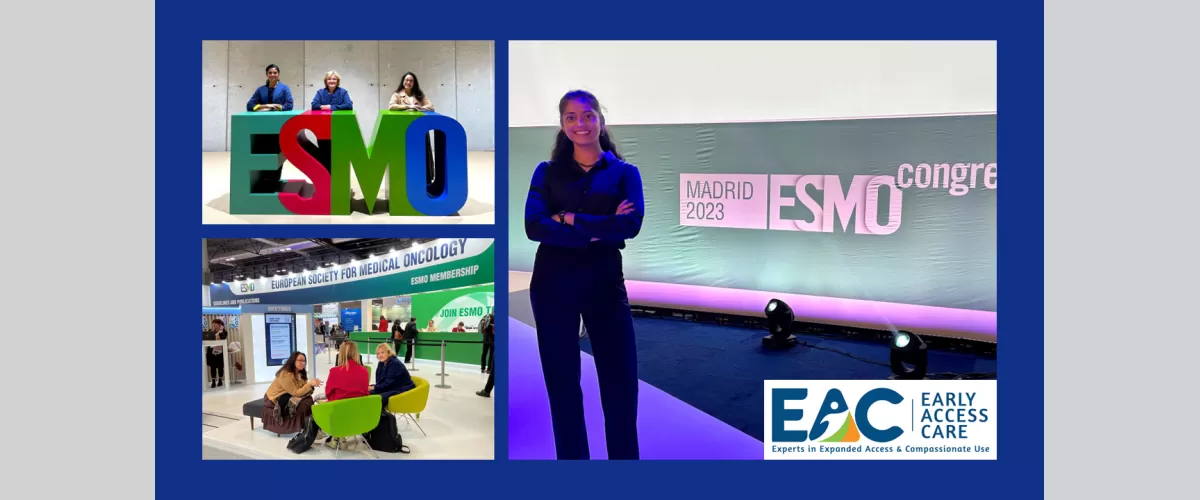EMSO Annual Meeting 2023

Early Access Care (EAC) participated in sessions at the European Association of Medical Oncology (ESMO) Annual Meeting on October 20-23, 2023.
“The strong sense of community and shared purpose in effectively treating patients with various types and stages of cancer reinforces the idea of collective responsibility,” said Anne B. Cropp, Pharm.D. Chief Scientific Officer at Early Access Care. “Our interactions with investigators, treating physicians, scientists, and pharmaceutical company sponsors at ESMO has been valuable, and we plan to incorporate our learnings from this meeting to execute global strategies across all our compassionate use and expanded access programs.”
The ESMO Annual Meeting brings together investigators and treating physicians for discussions about their prescriber experience with an investigational medicinal product prior to its introduction as a product that can be prescribed. These early insights into the treating physician experience are invaluable for pharmaceutical companies to understand and deeper characterize a drug. The use of an investigational medicinal product in a real-world setting is different than in a controlled clinical trial primarily due to patient co-morbidities. Patient co-morbidities may be an exclusion, or modified in severity, as a criterion of inclusion in a clinical trial. In contrast, treating patients in a well-designed early access program with targeted data collection offers an opportunity to understand both outcomes and adverse events as a form of real-world evidence (RWE) of effect and safety.
The recognition that RWE can provide important supplementary and complementary information to that obtained in randomized clinical trials is apparent. EAC captures RWE prospectively. It is incorporated in the planning stages of a named patient or compassionate use program, whether for single patient or groups of patients. One ESMO abstract (1720P) presented summarized that RWE was considered in deliberations in 22/75 (29%) European Public Assessment Reports (EPARS) increasing from 23% in the period of 2018-2020, to 39% in 2021-2022. We obtain reliable real-world, real-time data from many of our oncology programs. The prospective collection of RWE is definitely the better option, targeting only useful meaningful data.
Being a part of the ESMO Congress means that the EAC team is able to incorporate best practice and standard of care into new compassionate use / expanded access protocols. We’re often asked to develop the compassionate use protocols and physician guidance documents, and knowing the state-of-the-art information and tools enables us to provide pharmaceutical partners with relevant resources that become pivotal in the conduct of the programs.
Study results at the ESMO Congress 2023 help improve our understanding of newest therapies and patient needs when it comes to supportive care. For example, a growing number of early access programs incorporate Quality of Life validated questionnaires and lifestyle interventions such as physical activity, in the design. Interventions to help patients adhere to cancer treatments are beneficial as tools to educate and coach patients receiving oral treatments to continue to empower patients to remain on treatment. As non-adherence to oral therapy is multifactorial, incorporating technologies into early access programs allows an opportunity to educate the patient on the proper use and dosing of the investigational drug, reminders about whether the drug can be taken with food, frequency of administration, and other educational opportunities. This could also help alleviate the burden on healthcare providers.
In some instances, patients with cancers may not be eligible for any clinical trials, and often do not have other treatment options. In very specific circumstances pharmaceutical companies may provide access to their investigational medicinal product where there is a reasonable expectation of benefit over risk as defined in the company’s Compassionate Use or Expanded Access policy. Pharmaceutical companies are thoughtfully including early access programs into the planning stages of their product lifecycle.
The active participation of stakeholders in oncology – including physicians (both academic and patient-centric), pharmaceutical companies, and regulators is a meaningful reminder that there is more work ahead, and science both new and familiar, to explore more fully. Early Access Care is pleased to be a part of these conversations at the ESMO Annual Meeting.